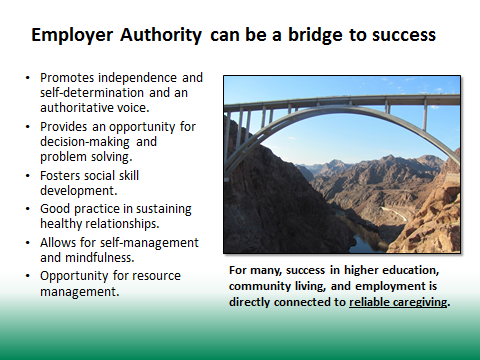Human Services Manager
The Wisconsin Transition Conference is an annual opportunity
for educators, professionals, families, and transition age youth to come
together to share best practices. I have
the wonderful opportunity to present “Who’s the Boss: Transition Age Youth and Employer
Authority” at the 2015 Wisconsin Transition Conference in the Wisconsin Dells.
What is Employer
Authority?
In a self-directed program, participants or members are
granted the decision-making authority to recruit, hire, train, and supervise
caregivers of their choice. The
participant or member is the boss!
Why is Employer
Authority so Important?
When we think about transition age youth, most of our
discussions focus on community-based employment, independent living, and higher
education. But for many, success in
these arenas is directly connected to reliable caregiving.
Young adults who choose to self-direct their supports take
on a big responsibility. Case managers
and consultants can provide some guidance, but the real work lies with the
individual or family.
Educators, parents, and professionals must acknowledge the
learning curve that exists and encourage young people to develop their Employer
Authority skills early on by discussing things like personal care needs,
caregiver preferences, activity schedules, and job descriptions.
I am very excited to work together with young people, families, and educators
to identify the tool kit, skills and support that will empower success in a
self-directed program.
Check out the slide below for a sneak peak of my
presentation.
